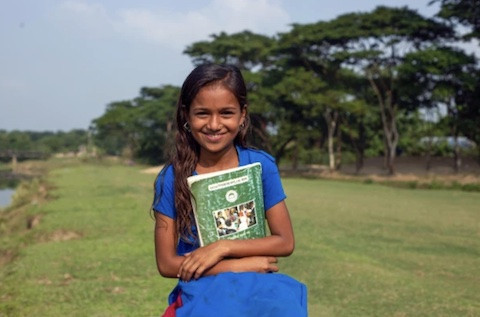
GCED Basic Search Form
Quick Search
当前位置
新闻

Every year on 21 February, the world celebrates International Mother Language Day, which was established at the initiative of Bangladesh by UNESCO’s General Conference in 1999. The Day is an essential platform to promote the importance of cultural and linguistic diversity, and multilingualism for peaceful and sustainable societies.
UNESCO has been leading the way and advocating for multilingual education based on the mother tongue from the earliest years of schooling. Research shows that education in the mother tongue is a key factor for inclusion and quality learning, and it also improves learning outcomes and academic performance. This is crucial, especially in primary school to avoid knowledge gaps and increase the speed of learning and comprehension. And most importantly, multilingual education based on the mother tongue empowers all learners to fully take part in society. It fosters mutual understanding and respect for one another and helps preserve the wealth of cultural and traditional heritage that is embedded in every language around the world.
However, there is still a long way to go before guaranteeing all learners their right to education in their mother language. In most countries, the majority of students are taught in a language other than their mother tongue, which compromises their ability to learn effectively. It is estimated that 40 % of the world’s population does not have access to an education in a language they speak or understand. There are about 7,000 languages spoken around the world today. But linguistic diversity is increasingly threatened as more and more languages disappear at an alarming rate. And when a language disappears, it takes with it an entire cultural and intellectual heritage.
Globally, progress is being made in multilingual education based on mother tongue with growing understanding of its importance, particularly in early schooling, and more commitment to its development in public life.
Through its normative frameworks for language policy and education, UNESCO shares good practices in bilingual and multilingual education and mother tongue instruction. It works with Member States to integrate multilingual education into curriculums and education systems. Recent successful initiatives to promote mother language-based education have taken place in Djibouti, Gabon, Guinea, Haiti and Kenya.
The findings from UNESCO’s new report From rights to country level action shows national efforts made by different countries to foster cultural and linguistic diversity.
In addition, UNESCO recently unveiled the World Atlas of Languages, an unprecedented initiative to preserve, revitalize and promote global linguistic diversity and multilingualism.
Impact of COVID-19 on mother language education
School closures due to the COVID-19 pandemic has exposed and deepened pre-existing education inequalities around the world. The closures ranged from a global average of 20 weeks to above 70 in some cases, more than a full school year. As always, it has impacted vulnerable and marginalized learners the hardest, which includes indigenous and speakers of languages from minority groups. According to UN estimates, nearly 500 million students from pre-primary to upper-secondary school were unable to access any remote learning opportunities during the lockdowns.
In many countries, distance teaching and learning tools, programmes and content were not always able to reflect linguistic diversity: They were largely provided in dominant national or international languages. When remote learning content is not available in students’ mother tongue, it increases the risk of learning loss, dropouts and exclusion. Many learners lacked the necessary equipment, internet access, accessible materials, content relevant to contexts and needs, and human support that would have allowed them to follow distance learning. Many teachers also didn’t have the skills and readiness for using distance teaching. They also struggled with digital tools in languages that they didn’t always master.
The massive digital divide shows how connectivity has become a key factor to guarantee the right to education. The lack of access to digital learning content is deepening inequalities, marginalization and exclusion. Another element that exacerbates the digital divide is the fact that many languages are not present on the Internet: There is a major linguistic divide in cyberspace today. The inclusion of languages in the digital world and the creation of inclusive learning content is vital. Remote learning based on the mother tongue should be incorporated into education systems in order for all learners, especially those from linguistic minorities, to access education during school closures and beyond.
This year’s International Mother Language Day theme, “Using technology for multilingual learning,” is an opportunity to take stock of the experience of the past two years, to move forward differently and better.
- More on International Mother Language Day
- More on UNESCO’s work around languages in education
URL:
https://www.unesco.org/en/articles/why-mother-language-based-education-essential
